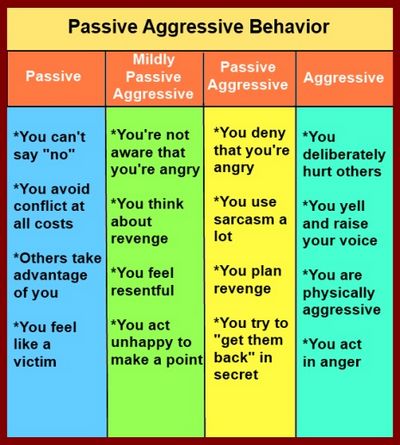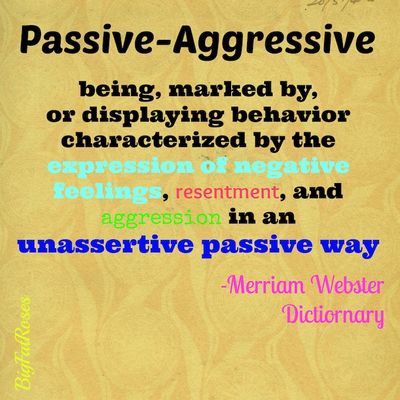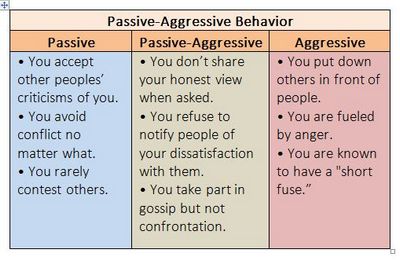The Definition of Passive Aggressive Behavior
Passive aggressive behavior is the most common form of aggression and it’s used by both adults and children.

If you’ve ever seen an individual act in this way, then you may have wondered what it was all about. The following passive aggressive definition will help you better understand what this behavior really is.
The passive aggressive definition is very basic. Basically, passive aggressive behavior is a means of expressing anger or irritation, but without publicly expressing those feelings. Instead of expressing their feelings directly, individuals who engage in this kind of behavior often share their negative emotions through other actions. For example, if a parent yells at their child, the child will likely do some sort of physical reaction to that, whether it’s screaming or kicking their foot into the air in frustration.
However, the passive aggressive definition doesn’t mean that a person is completely blameless in their actions when they engage in this behavior.

Even if the words that they speak aren’t out in the open, the same negative feelings that come with anger will still be felt by the other person.
In order to make the passive aggressive definition a little clearer, it may be helpful to examine the definition of anger itself. Anger is defined as the physical reaction that one experiences in response to another individual’s action. This doesn’t mean that you have to actively engage in the activity that leads to your anger.
A person can have passive aggressive behavior without actually acting out their anger. They may verbally berate another individual when the latter makes a wrong decision, or they may verbally abuse another individual when they don’t get their way. It all depends on how their mind works. Most people who experience this kind of passive aggressive behavior are typically not in control of their actions.

Their mind is simply reacting automatically to the situation rather than actively choosing to react differently.
In addition, passive-aggressive behavior can also be carried out through a variety of other behaviors. For instance, if a child bullies another child, they may become more aggressive than they already are.
While it may be easy for some to mistake this type of aggressive definition as a way of trying to excuse their behavior, it isn’t. The passive aggressive definition simply means that when a person does things that are out of line, they simply refuse to change them. While that behavior can sometimes be justified, it can also be used as an excuse to carry out unwanted acts.
It’s important that you understand the passive aggressive definition of this type of aggression in order to avoid being victimized by other individuals who use this behavior in order to hurt others. Many of us are guilty of using this definition in our everyday lives and we continue to repeat these behaviors until it stops. If you feel you’re being abused or treated unfairly by someone, then you should contact a reputable attorney to help you determine the best course of action.
An attorney can provide you with an honest evaluation of your situation and help you identify the best and most effective strategy for your needs.

If you don’t feel comfortable speaking with an attorney directly, you can also choose to work with a firm that offers this type of legal advice.
Some attorneys are well-versed in dealing with cases of passive aggressive behavior and can offer you the guidance you need. Others are simply not, which can make the process a little more challenging. When you work with an attorney who has years of experience handling similar cases, you can have a better chance of receiving an honest diagnosis and treatment for your particular situation.
You may be wondering how you’re able to know whether you’ve been victim to this aggressive behavior. You may be aware that you’ve always felt as if you were being treated unfairly because you didn’t “earn respect” in some way. However, many individuals never have to face their inner demons until they become overwhelmed by their own emotions.
Passive aggressive behavior can be difficult to handle and often affects relationships. If you do have this type of behavior, then you should seek professional assistance to ensure that you’re receiving the best possible advice.